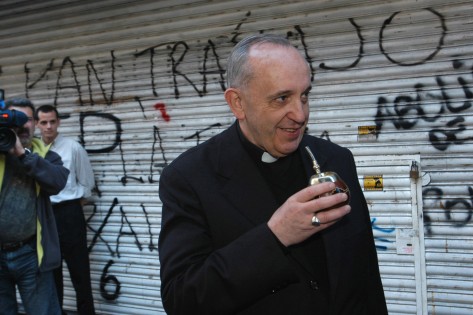A friend passed along a recent issue of The Tablet, the weekly magazine from the UK. It includes an excerpt from a new book on Jorge Mario Bergoglio, Pope Francis: Untying the Knots by Paul Vallely. Unfortunately, it’s only available online to subscribers. (You can visit the link here). But the excerpt charts the transformation of Jorge Bergoglio during his years working among the poor:
One of [Bergoglio’s] Jesuit pupils, Fr. Rafael Velasco, now rector of the Catholic University of Cordoba, said: “Bergoglio was so very conservative that I was rather shocked years later when he started talking about the poor. It wasn’t something that seemed at the top of his agenda at the time, but clearly became so as a bishop. Something changed.”
The Pope’s old friend, Rabbi Abraham Skorka, insists that “he has changed according to his life’s experience.” Fr. Miguel Yanez, who was received into the Jesuits by Bergoglio, and is now head of moral theology at the Gregorian University in Rome, said: “He did change. It was mostly when he was a bishop and an archbishop. Being outside the tensions and complex atmosphere of the Society of Jesus, he possibly became more open to dialogue and more open generally.”
What transformed Bergoglio? External events played their part. The end of the Cold War and the restoration of democracy in Argentina in 1983 after the fall of the military junta made working with the poor seem less threatening. But regular contact with the poorest of the poor in the Buenos Aires slums played a part. There, Bergoglio learned to see the world differently, said Fr. Augusto Zampini, a diocesan priest from Greater Buenos Aires. “When you’re working in a shanty town, 90 percent of your congregation are single or divorced. You have to learn to deal with that. Communion for the divorced and remarried is not an issue. Everyone takes Communion.”
Bergoglio never altered his doctrinal orthodoxy on such matters, but he did not allow dogma to overrule the priority of pastoral concern. “He was never rigid about the small and stupid stuff,” said Fr. Juan Isasmendi, the parish priest in Villa 21 slum, “because he was interested in something deeper.”
Bergoglio’s visits to the slums brought him into contact with a huge number of ordinary people. One slum priest estimated that over his 18 years as bishop and archbishop, he must have personally talked to at least half the people in the slum. He would just turn up, wander the alleyways, chat to the locals and drink mate herbal tea with them. Fr. Guillermo Marco, his aide for eight years said: “He doesn’t see the poor as people he can help but rather as people from whom he can learn.”
This looks to be a fascinating read, and another glimpse into the life and thinking of the pope.












